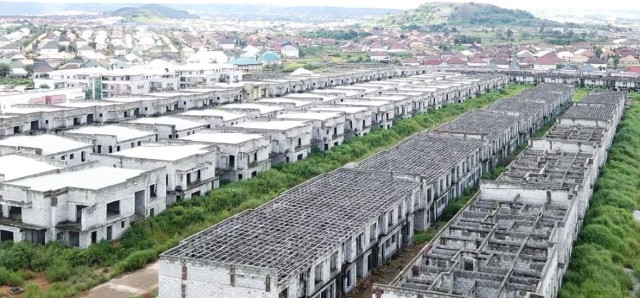The Federal Government has finalized plans to sell a large estate associated with a former Governor of the Central Bank of Nigeria, Godwin Emefiele, to low and middle-income Nigerians.
This extensive property, which includes 753 housing units, was recovered by the Economic and Financial Crimes Commission (EFCC) in December 2024, making it the largest asset recovery by the agency since its establishment in 2003.
Spanning over 150,000 square meters, the estate features duplexes and various apartment types. The property was seized following a final forfeiture order from Justice Jude Onwuegbuzie of the Federal Capital Territory High Court in Abuja on December 2, 2024.
Following this, Emefiele attempted to reclaim the estate in April 2025 by petitioning an FCT High Court, claiming the EFCC had knowingly hidden the forfeiture proceedings from him while he was in contact with the agency about other charges.
However, his application was rejected by the court. On May 20, 2025, the EFCC Chairman, Ola Olukoyede, officially transferred the 753 housing units to the Minister of Housing and Urban Development, Ahmed Dangiwa.
The Director of Press and Public Relations at the Ministry of Housing, Badamasi Haiba, stated that, as part of President Bola Tinubu’s Renewed Hope Agenda, the government is committed to ensuring that ordinary Nigerians benefit from the estate.
He mentioned that the estate is still under development, and the ministry will first carry out structural and integrity assessments before determining the sale and allocation process.
Haiba stated, “The next step is to profile the houses and decide how they will be sold to Nigerians. The minister's consistent aim has been to promote homeownership for all types of Nigerians, including those with low and middle incomes, so we can anticipate inclusive measures here.”
Regarding the sale method, he noted that the ministry would utilize its online portal and assured that payment options would be flexible, including mortgage, installment, and rent-to-own arrangements.
These 753 units are just part of over 10,000 homes nearing completion across the country under the Renewed Hope Housing Programme.
The ministry has established a web portal for housing sales – renewedhopehomes.fmhud.gov.ng – and the same process will apply to these confiscated properties. When asked about the timeline for opening the portal to potential buyers, he stated that the construction must be completed first, as work was still ongoing prior to the EFCC's recovery of the estate.
Concerns were raised about the allocation process, with Haiba addressing speculations that the homes would go to those in power. He claimed, “There will always be speculation, perhaps due to past experiences.
The current Renewed Hope administration is striving for more transparency and accountability. The renewedhopehomes.fmhud.gov.ng portal minimizes human interference in the sales process to ensure it is transparent and inclusive. Any Nigerian can log onto the portal from home, browse available units, select their desired house, choose a payment method, submit an application, and instantly receive an offer letter.”
However, reports indicate that previously active construction site in disarray and neglected, with overgrown vegetation taking over the unfinished duplexes. Security personnel guarding the estate denied access, but a view from outside revealed a property overtaken by dense undergrowth and reptiles. Security guards from surrounding estates reported having to deal with snakes that have wandered into their areas from the abandoned estate, stating, “When construction was active here, snakes were not an issue. But now, since work stopped, they've been coming from that overgrown estate. We’ve killed many.”
Construction on the estate reportedly halted in July 2023, shortly after Emefiele's arrest by the Department of State Services in June of the same year. The guards indicated that construction had progressed rapidly before the halt, and noted that Emefiele never appeared in person but they were aware that a wealthy individual was financing the project. An external tour of the estate showed it was completely enclosed with a combination of concrete and block fencing, with at least two duplexes appearing finished while others were at varying stages of completion.
Real estate professionals expressed skepticism regarding the feasibility of low-income individuals benefiting from the properties.
A former president of the Association of Town Planning Consultants of Nigeria, Moses Ogunleye, voiced doubts, saying, “I don’t see how low-income earners could afford properties of this size. If the Federal Government aims to complete these structures before selling, the cost will likely be beyond their reach. Even if sold as-is, the price will burden buyers significantly.”
President of Fajiri Construction Limited, Stephen Eke, described the government’s plan as well-intentioned yet impractical, given the high-end materials often used for luxury properties.
He suggested selling the estate at market value and allocating the proceeds to a social housing fund to build affordable homes for low- and middle-income groups.
CEO of Magnificent Choice Services Project and Engineering Ltd, Jeremiah Akinsele, called for the estate to be sold at fair market value, emphasizing that discounted sales would likely lead to resale to wealthier individuals, contrary to its intended purpose.
He noted that the existing pricing makes the properties unattainable for low-income earners, suggesting the government should focus on creating affordable housing for vulnerable groups through efficient and practical designs.
The need for transparency and inclusivity in the sales process was stressed by Aliyu Wamakko, a former president of the Real Estate Developers Association of Nigeria, who advocated for a competitive bidding process open to all interested Nigerians. In contrast, the Housing Development Advocacy Network proposed that the estate be converted into a premier social housing project with affordable rental units for vulnerable populations, suggesting a digital raffle for allocation to ensure equitable access.
The Executive Director of HDAN, Festus Adebayo, highlighted the potential for a self-financing model through raffle ticket sales, which could fund the remodelling and completion of the estate while providing a unique opportunity to support Nigeria's underprivileged citizens.




















